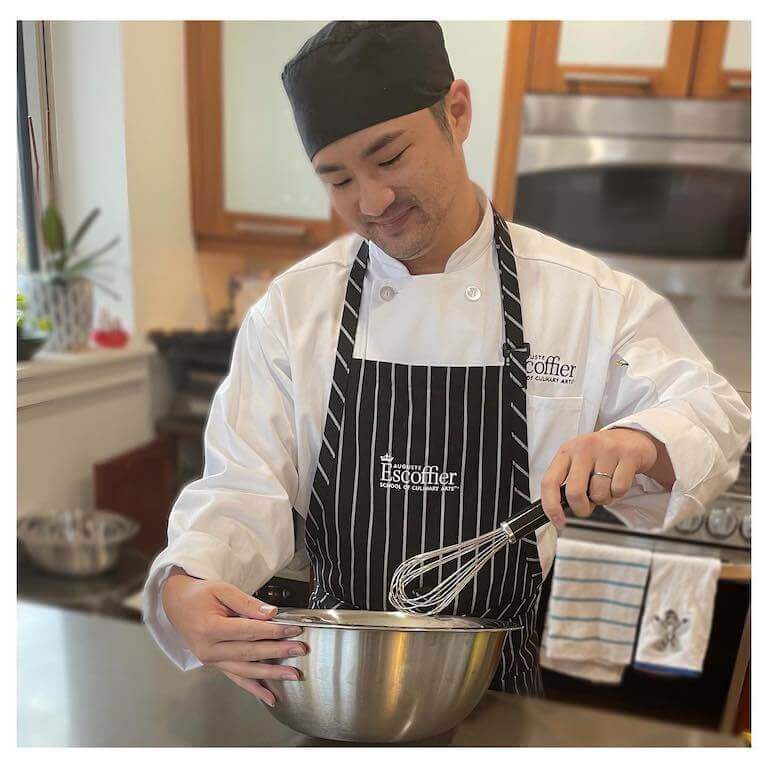Most students—whether they’re pursuing a vocational credential, an associate degree, a four-year degree, or a graduate degree—need to keep their expenses in check while they’re getting their education.
How you go about saving money will depend on your personal financial circumstances. Start by reviewing these tips to see if you can trim down your costs and improve your finances during your time in school.**
Note: This article is for informational purposes only and not meant to give professional financial advice. Always consult a financial advisor regarding your specific situation.
How You Can Save Money On Living Expenses
Start by looking for ways to build a budget and reduce your living expenses while you’re in school. With some smart planning, you may be able to keep your costs low and still enjoy yourself!**
1. Make a Budget
It’s not the most exciting piece of advice. But it may be the most practical. Until you know how much money is coming in and how much money is going out each month, you’ll never know whether or not your finances are on track.
A smart budget could include spending goals for different categories, like food, transportation, entertainment, utilities, and insurance. When you know that you have limited food dollars each month, it can put that impromptu pizza delivery order in context and help you make a smarter decision.
There are many different budgeting methods. Some people choose to use a simple spreadsheet where they can track their spending. You could create your own custom spreadsheet or do a quick Google search for a pre-made template.

A budget could help you stay on top of your spending each month.
You could also use an app like You Need a Budget (YNAB) or Mint. These apps let you manage your finances from your smartphone wherever you go. Plus, they may integrate with your checking account, so your expenses upload automatically to the proper categories. These apps may also send you notifications when you approach the limit for your monthly spending in each category.
For an even simpler approach, you could try the envelope method. Here’s how it works: set a spending budget for categories like entertainment, transportation, groceries, and dining out. Then, withdraw cash to cover each category, and put that cash into individual envelopes with the category name on the outside. Spend the cash from the appropriate envelopes throughout the month. And when it’s gone, it’s gone! No more cash for that category until next month. This method can work especially well for people in cash industries like servers and bartenders, who don’t always make it to the bank to deposit their tips.
2. Automate Your Bill Payments
Late fees and interest charges are NO fun. And they can add up quickly. The average American loses $577 annually to late fees, overdrafts, and the ensuing damage to their credit. No one wants to throw away that kind of money!
To help protect yourself, consider automating your bill payments. Many banks offer online banking tools that let you set up automatic payments. You may be able to pay your utility bills, rent, credit card bills, cell phone, and even student loan payments on a recurring schedule every month. This can keep you on top of those payments and prevent costly late charges.
You could also schedule monthly transfers into a savings account or an investment account. By automating your savings, you can prepare for unexpected expenses without even thinking about it. Just make sure there are enough funds in your checking account before your bills come due to prevent overdraft fees with your bank.
3. Look for Student Discounts
A student ID can be your ticket to discounts all over town. Many businesses, especially those near schools, offer deals on food, public transportation, movies, and more. Prioritize buying from businesses that offer student discounts so you can take advantage of those deals.
And if you’re not sure where to start, ask your school! They may have a list that they can share.

Look for local businesses that offer student discounts to save on everyday expenses.
4. Shop In Bulk if You Can
In general, the larger the quantity of something you buy, the cheaper it will be per ounce or per product. Buying in bulk can be great for household needs like paper towels, toilet paper, canned food, dry goods like beans and rice, and cleaning supplies.
Now, buying in bulk may also come with a higher upfront cost. If you only have $50 for groceries for the week, it’s understandable that you wouldn’t want to spend $15 on an economy-sized pack of chicken. But if you can afford it and have the freezer space, then you can save on that chicken by the ounce. And if you’re starting an online culinary school program, you may want to consider bulk purchases for items you know you’ll be using all the time in your culinary curriculum, like salt and pepper, olive oil, and butter (which you can freeze).
5. Eliminate Unnecessary Subscriptions
Subscription services are a common part of our everyday lives. But if they’re not being used, they can add up and be a major drain on your budget. Which subscriptions are must-haves, and which ones can you do without? For example, if you have a gym membership that you only use a few times per month, you may wish to cancel it in favor of at-home workouts. (There are tons of helfpul workout videos on YouTube!)
Also, think about where you’re doubling up. Do you really need Netflix and Hulu and Peacock and HBO Max and Amazon Prime Video? Maybe you can cycle those subscriptions based on when your favorite shows are released. Or if you have a roommate, you can cover Netflix while they cover HBO Max.
6. Look for Free Entertainment
A life on a student budget doesn’t have to be boring. There is plenty of free entertainment out there if you know where to look.
The library is an amazing resource for free books, but many also offer free movie rentals. You may not find the most recent blockbuster release, but you may find slightly older movies, plenty of classics, and even TV box sets.
You can also look for free events like live music, community theater, and movies in the park. You can go for nature walks or hikes on local trails. And many museums offer a free day once a month, or a student discount every day.
Free Fun in Austin, Texas, and Boulder, Colorado
Attending culinary school at Escoffier on the Austin or Boulder campuses? Here are some ways you could have fun for free.
Free Entertainment in Austin, Texas
- Walk or bike the Ann and Roy Butler Hike-and-Bike Trail circling Lady Bird Lake
- Visit Zilker Park in the heart of the city to play disc golf or have a picnic
- Climb the 109 steps at Mount Bonnell for stunning views of the Colorado River
- Follow the Tejano Walking Trail to discover culturally important sites in East Austin
- Window shop the boutiques and shops on South Congress
Free Entertainment in Boulder, Colorado
- Hike the trails of Mount Sanitas or the Flatirons for gorgeous views
- Visit Red Rocks Amphitheatre. Concerts aren’t usually free, but you can visit the park and amphitheater for free on non-concert days to hike and see the sites
- Wander Pearl Street Mall to people watch and peek in at the many charming boutiques
- Take a walking tour to spot sculptures and murals throughout the city
- Visit the Boulder Museum of Contemporary Art to explore genre-defying exhibitions for free every Saturday

Boulder has plenty of natural beauty to explore…and much of it is free!
How You Can Save Money On School Expenses
The other side of saving money during college or postsecondary school is keeping your education expenses in check. Use these tips to try to minimize the cost of your education so you can start your post-school career in a stronger financial position.
7. Apply for Scholarships (and Keep Applying!)
Minimizing the amount you pay out of pocket for tuition is one of the smartest moves you can make during your post-secondary education. And one way to do this is through scholarships and grants.
Leave no stone unturned in the search for scholarship money! Consider these sources:
- Scholarships directly from your school
- Scholarships from private companies in the industry you wish to pursue
- Scholarships from trade groups in the industry you wish to pursue
- Need-based scholarships
- Scholastic scholarships
- Competition-based scholarships
- Scholarships from your employer
- Scholarships based on your demographics or life stage
Specifically, culinary school students have a lot of options when it comes to scholarships. The Escoffier Scholarship Foundation offers need-based scholarships to select students. And groups like the National Restaurant Association, state restaurant associations, and the American Culinary Federation offer financial awards as well.
The hunt for scholarship money doesn’t end when you enroll in school. You can (and should) continue applying for funding throughout your entire college or vocational school career. If you can secure a handful of $500 or $1,000 scholarships, you could save thousands in tuition and interest payments in the following years!
8. Attend School Online So You Can Live At Home
One of the costs associated with postsecondary school is living expenses. We discussed tips to reduce these expenses above, but what if you didn’t have to move out on your own at all?
With an online program, many students can continue to live at home while they get their education. This means they may save on the costs of relocating, which may include rent, security deposits, setting up utilities, moving trucks, and much more. Plus, students don’t have to pay to maintain a car or pay for public transportation to get to school.
Even adult students who already live in their own homes can avoid relocating and save on transportation costs by attending school online. There are plenty of benefits of attending school on-campus, but if this doesn’t feel like an option for you, online instruction is a great alternative.
This option isn’t limited to students in a traditional university setting. At Auguste Escoffier School of Culinary Arts, students can pursue education in online culinary school, pastry school, plant-based culinary school, hospitality school, or opportunities in food entrepreneurship, and holistic nutrition and wellness. Between live lessons, pre-recorded videos, reading, and completing cooking assignments in their home kitchens, students can get an in-depth, hands-on education similar to their on-campus counterparts.

An Escoffier student working on a project in his home kitchen.
9. Buy Used Textbooks
Textbooks can be a substantial expense for college students. In some classes, a single new textbook could cost hundreds of dollars. Second-hand textbooks can sometimes be found online for a fraction of a new version. As long as it’s the correct edition and it’s in decent shape, a used textbook can be just as useful while saving you a lot of money.
10. Borrow Responsibly
Many students use student loans to cover some or all of their education. Loans can make postsecondary education possible for students who would otherwise not be able to afford it, and they’re a wonderful resource!
Just remember that any amount that you borrow must be repaid, with interest. Instead of borrowing extra to cover living expenses, it may be better to cut your costs and possibly get a part-time job to cover the bills while you’re in school. You’ll thank yourself later.
“If you choose to use a student loan, be a smart borrower. Construct a budget and only borrow what is needed to cover your school expenses such as tuition. The Financial Aid office at Escoffier is here to answer your questions and help you make the right decision.”*
Jason Rodriguez, Escoffier Director of Financial Aid
Take Financial Stress Out of School †
Each individual’s financial picture varies depending on how much they earn and how much they spend. By tracking your expenses and making some smart changes, you may be able to make your time in school less stressful and more enjoyable!
To start painting your financial picture at Escoffier, get in touch! Our Financial Aid Department can answer your questions about funding and help you to understand the resources available to you.†
To learn more about financing your education, try these resources next:
- How Financial Aid Works: FAQs About Funding for Culinary School
- How Much Can Culinary School Cost and How Can You Pay For It?
- Can You Deduct College Tuition From Taxes?
*Information may not reflect every student’s experience. Results and outcomes may be based on several factors, such as geographical region or previous experience.
**Always consult a financial advisor regarding your specific situation.
† Consider your situation and resources to determine what is affordable and on budget, for you.

 “If you choose to use a student loan, be a smart borrower. Construct a budget and only borrow what is needed to cover your school expenses such as tuition. The Financial Aid office at Escoffier is here to answer your questions and help you make the right decision.”*
“If you choose to use a student loan, be a smart borrower. Construct a budget and only borrow what is needed to cover your school expenses such as tuition. The Financial Aid office at Escoffier is here to answer your questions and help you make the right decision.”*